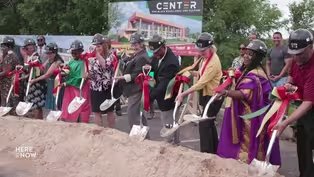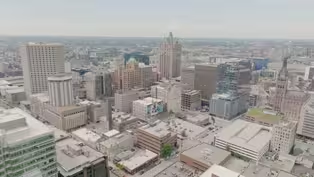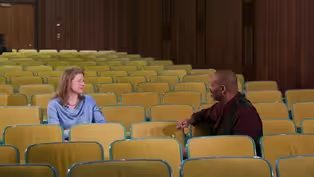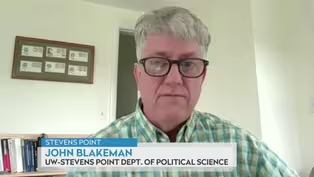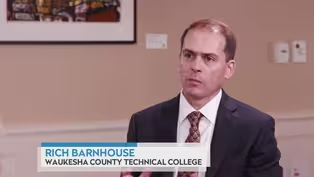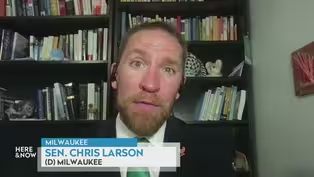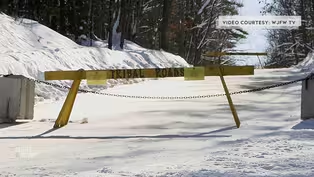Here and Now
Here & Now for June 21, 2024
Season 2200 Episode 2249 | 26m 48sVideo has Closed Captions
Watch the entire episode of Here & Now for June 21.
Watch the entire episode of Here & Now for June 21.
Problems playing video? | Closed Captioning Feedback
Problems playing video? | Closed Captioning Feedback
Here and Now is a local public television program presented by PBS Wisconsin
Here and Now
Here & Now for June 21, 2024
Season 2200 Episode 2249 | 26m 48sVideo has Closed Captions
Watch the entire episode of Here & Now for June 21.
Problems playing video? | Closed Captioning Feedback
How to Watch Here and Now
Here and Now is available to stream on pbs.org and the free PBS App, available on iPhone, Apple TV, Android TV, Android smartphones, Amazon Fire TV, Amazon Fire Tablet, Roku, Samsung Smart TV, and Vizio.
Providing Support for PBS.org
Learn Moreabout PBS online sponsorshipWisconsin.
PBS Wisconsin original production.
>> You're watching "Here& Now" 2024 election coverage.
Less than one week after Donald Trump calls Milwaukee a horrible city, I love Milwaukee.
I was the one that picked the Milwaukee.
He opens his latest Wisconsin rally, revising his sentiments about the city that will host the Republican National Convention next month.
I'm Frederica Freyberg tonight on "Here& Now, we look at messages from the presidential candidates and how they're resonating with Wisconsin voters.
More two year UW campuses are closing.
But there's a new solution in sight.
And a lawmaker and Milwaukee parent attempts to give context to the district's dire financial situation.
It's "Here& Now" for June 21st, funding for "Here& Now" is provided by the Focus Fund for journalism and friends announcement that UW Oshkosh Fox Cities will close at the end of this school year brings to six the number of two year campus closures across the state, what some have called a demographics.
Cliff leaves, enrollments at the branch campuses, falling to the point where the UW administration says the status quo is not sustainable because even with deep cuts and closures, the universities of Wisconsin System projects a nearly $17.5 million deficit through 2025.
Now, it's not like the writing hasn't been on the wall, or that people haven't tried to stave off closures.
But our next guest says, what's happening now?
Didn't have to be inevitable.
Rich Barnhouse is President of the Waukesha County Technical College and a former vice chancellor in charge of enrollment at UW colleges.
We should note PBS Wisconsin is part of UW-Madison.
>> I think if there had been a collective approach to looking at what was going to be coming down the line and about 10 or 15 years with really, acute thinking about what we wanted to be as a system, as, as universities, as we approach 2030 and 2035, taking into consideration things that we knew were real demographics.
Right?
We we've known for years, not just in Wisconsin, but across the country, that there was going to be a major change in the demographics that were going to impact colleges and universities.
That's certainly things that we couldn't really anticipate.
You know, one of those obviously being how people feel about a college or university education and what Gen Z was going to do or be interested in when they got to college, or what type of experience they wanted, how much they were willing to pay those things we couldn't really see.
But the thing that we could was simple demographics.
And had we started thinking about it in a proactive way early on, I think we could have had a robust conversation and come up with some reasonable solutions.
I don't think that that would have meant that nothing would have changed, or that there wouldn't have been things that might have contracted, but it might have been done in a way that I think people would have found a little bit more reasonable.
>> It is true that people have been talking about that so-called demographic cliff for decades.
Why the inaction?
>> You know, I'll just speak broadly about higher education in general.
I've worked on a number of different states.
I think that there is this concept that if we continue to do what we're doing, which is really, really good, truthfully, if we continue to do it, the forces, the market forces, the demographic forces won't impact us because what we're doing is really, really good work.
And it's having a major impact on society and the economy.
So I think higher education has often been shielded from what businesses find to be a harsh reality.
And now in higher education across the country and of course, Wisconsin as well, we find ourselves in the middle, right directly in the middle of that reality.
>> As to the two year colleges, which are the ones that are being announced, are closing or have closed already, was there ever a benefit to the duplication of the four year and the two year campuses?
>> Sure.
There was absolutely.
For years and years, the two year UW really behaved like the elastic band for the system.
So as enrollment changed over time, sometimes there would be ballooning enrollments and then sometimes there would be a decline.
And so the UW colleges for years served as that elastic band that really managed, I think, quite well, how many students were going into the four year institutions and managing that on the front end?
And so I think there was a time where it did work really well.
The other thing is, you know, years ago there just wasn't the technology available to do anything remotely or by distance.
And that certainly over the past 20 or 25 years has changed things as well.
And I think also, and this is just my opinion, but there was a significant tie to local communities that students coming out of high schools had.
And that's changed quite dramatically as well.
>> Why not just kind of have the technical college system take over the UW two years?
>> My immediate thinking on that is what merger does is it simply moves an existing issue or problem somewhere else.
It doesn't solve that problem.
So, for example, if the two two year systems, colleges and the tech colleges were combined, the problem still exists.
The number of campuses, the declining enrollments, the number of faculty, and the overall financial picture that doesn't change at all.
It just shifts where that issue goes and who has to solve it.
And so for that reason, merger isn't a solution.
It just moves the problem to a different place.
>> And yet I thought I read that you said that, for example, at your technical college, you have capacity, you have space, you have the infrastructure.
So what does that mean?
>> Well, I can give you a real life example of what we're doing right now.
So Chancellor Mahoney.
Chancellor.
Chancellor Milwaukee, a good friend and colleague of mine.
We've been talking for a number of years, and recently you've probably heard that UW Milwaukee is closing their Waukesha campus.
So what Chancellor Mahoney and I decided to do was not simply bring those the majority of those students over, should they want to continue to Wkctc.
We decided to take a significant leap forward.
And I think what could be a model for the state, and that is we're going to build a, university center right on our campus so that students can participate with Wkctc as well as, and what we really know is going to happen is that a lot of students will start in their associate degree of a variety of fields and end up taking baccalaureate degree classes, is that anybody in the community can take anything from a short term certificate all the way through graduate programs right on our campus with seamless interaction.
So that students really don't feel the sort of jerky thing that happens during a traditional, transfer process.
>> And how is that being looked at?
On the part of administration, UW like it is a model?
>> Well, I, I think and to their credit, the other campuses are thinking we're going to wait and see if Chancellor Mooney and President Barnhouse and their teams can pull this off.
We know that we will.
We're very excited about it.
And I think that the response from both systems has been, I would say, very positive and really supportive.
And I think for the legislators that I've spoken with, they're also quite supportive of us taking a different look at how we can provide higher education in a really strong partnership way, almost like siblings, and delivering for the community great rich Barnhouse, thanks very much.
Thank you very much.
>> This week, millions of people across the country celebrate June 19th, also known as Juneteenth Day.
The date marks the end of slavery in 1865.
A Wisconsin based organization purposely broke ground on June 19th on its center to help black Wisconsinites.
Hundreds took part in the groundbreaking celebration of the center for Black Excellence and Culture Complex on Madison's south side.
The $33 million project is the long time vision of Reverend Alex G. He says the center will cultivate black history, education, culture and innovation in his childhood community and across the state.
>> Today, we break the ground beneath us, but tomorrow we break the mold by by inspiring future young black history makers who will embody the essence and the power of the dream of our ancestors.
This was their dream.
On Juneteenth Day, June 19th, 1865, when the word of freedom finally reached their weary but ready ears.
>> The center for Black Excellence continues to raise funds to help pay for staff operations and programs.
It's expected to open by the end of next year.
In other news, outside auditors have until Monday to submit proposals taking a fine tooth comb to Milwaukee Public Schools financial manager sent a separate audit ordered by Governor Tony Evers, will examine the district's instructional practices and the audits are on a fast track after financial scandal rocked Mnps earlier this month, resulting in the resignation of its superintendent.
The loss of millions of dollars in withheld aid over missing financial data and a chorus of naysayers even calling to dissolve the district .
Milwaukee Democrat Chris Senate Education Committee and is an NPS parent.
He's here with his thoughts on this mess.
And, Senator, thanks very much for being here.
Frederica.
So you support MPs and send your children there.
>> But how shocking was all of this for you?
>> Yeah, I mean, it was a surprise, when we got our first call, right before the memorial Day weekend, that there was reports that had not been adjusted for audits, going back months, and that there had been a problem in communicating between DPI and the administrators at Milwaukee Public Schools and that that was going to result in the delayed aid payments for special education reimbursement and possibly larger, so, yeah, I was surprised as, as everybody about this, especially given the implications.
constituents this week offered a lesson in kind of how this went down.
First, you dipped back into history explaining how in the 1990s, the business office at NPS was consolidated into the superintendents office.
How in your mind did that pave the way for what's happening now?
>> Yeah.
So bac, originally as it had been functioning, it was divided, so you had the superintendent who was in charge of instructional, management, and then you had the financial side that was governed by the board.
Howard Fuller, who is the superintendent of NPS at the time, asked for the power to shift from the board over to have it completely under the superintendent, there needed to be a state law change.
They went to the state legislature and the governor who made that change in the budget and then shortly thereafter, the school board consolidated those powers under the superintend audit.
What they did is they eliminated financial , check of making sure that what was happening over there was going to be checked not just by the superintendent, but by the school board.
So since then, they've only been able to trust whatever the superintendents office is saying because the financial manager is over on that side.
>> So you also point out that the district's finance office has been critically understaffed, resulting in these failures.
>> Whose fault is that?
>> Yeah, I mean, look, they are down 12 positions, two key ones by their, their own definition on that is something that the school board actually asked about in a meeting back in December, about staffing issues, because trying to make sure that they were staffed up, was a priority for them, the superintendent's office said point blank that they were staffed up and that they were only short two, so they tried to the best of their ability.
The school board tried to make sure that these positions were filled and that things were being done in a proper way, but again, if you don't have a proper check, you don't actually know what's going on.
And I would add, I think it's worth noting that I think, you know, for viewers, a lot of times they view all elected officials as being on the same plane.
But for school board members in Milwaukee, much part time, mostly volunteer positions where they are each paid less than $20,000, which, to put it in perspective, people working minimum wage job, make just about that for the number of hours that they're putting in, all of them have full time jobs beyond this.
And so their ability to be able to do their own financial research is, is fairly limited.
They do not have staff as legislators do, as other people in other offices do.
So they can ask the questions, but they're really at the mercy of the superintendent, his office, and what they're going to present to them.
>> And so you're suggesting that there surprise in this information is kind of not their own fault?
>> Well, I would say, look, if you want to have a professional board, of people who are governing the largest school district in the state, and this is a, a budget that is larger than any municipality in the state of Wisconsin, including Milwaukee, you might want to have them be in full time positions to do that work.
And there's been a reluctance to elevate them that to that level, but you would avoid a lot of these problems, right?
>> So you, you take issue, though, with people who malign the district or call for its dissolution, but is this not an outrage that hurts the students?
Some of our most vulnerable students, the most?
>> Yeah, I mean, indeed.
And I am frustrated as well.
But I think it's better to put the frustration right where it belongs.
And I would put that at the state, not at the school board level.
There has been a malicious and deliberate underfunding of public education in our state for decades, you can mark on a, on a chart that 15 years ago on a per pupil basis, students were worth more than they are today.
They they are not even keeping pace with inflation.
And so to expect better outcomes, especially for kids in public school, many of whom are homeless, many of whom are, malnourished and have other needs.
And if we're not funding those underlying problems, funding solutions to those, well, we're going to get these exact same results.
So it's a little disingenuous to try and go to the same people who have been carving up MPs and attacking it for years and asking them what they think we should be doing.
It's kind of like a cow asking the butcher how to be able to live a long life.
>> Senator Chris Larson, we leave it there.
Thanks very much .
Thank you.
In northern Wisconsin, the year and a half long dispute over road easements reaches a new juncture.
The town Board of Lac du Flambeau recently voted that they would no longer pay the tribe.
The Lac du Flambeau Band of Lake Superior Chippewa, an increasing monthly amount to keep four roads open, saying they can't afford the cost.
The tribe says they do not accept the town's decision to reduce the amount the town voted to make a full June July payment of $46,000 and paid $20,000 per month going forward.
In January of last year, the tribe closed the roads after a decade of expired easements and no new agreement in sight.
The roads, which provide access to Non-tribe residents, are part of the reservation land.
The tribe removed the barricades after the town agreed to pay monthly fees in exchange for access until a new agreement is reached.
The tribe is seeking damages totaling nearly $10 million, half of its original request to remedy years of town residents trespassing.
Both the town and the tribe have expressed a desire to open the lines of communication.
However, the tribe says it will take necessary actions if the town does not make monthly payments of the amount previously agreed upon.
In Racine.
Donald Trump's visit this week marked his third trip to Wisconsin this year, and we will see much more of him with the Republican National Convention in Milwaukee next month.
What a ride.
It has been since he first entered the race for president in 2016.
It was at that time we discussed his nascent run with Uw-stevens Point professor of political science John Blakeman.
We check back in with him now.
And nice to see you, Professor.
>> Thank you.
>> So of course, Donald Trump won Wisconsin and the presidency in 2016, but we talked a lot then about how he was leading with how it would be a rigged election.
And clearly that still figures prominently in his messaging.
>> Yes, that is absolutely true.
The fact that so many federal and state judges dealt with different, different cases concerning the 2020 election and , and it still resonates so strongly against a good percentage of within the electorate, just strikes me as completely bizarre, you know, and it's something that political scientists are studying.
But no one is really able to fully explain why this the big lie, as it's called, has become so entrenched in a part of the electorate in Racine this week, he continued to say that he did a lot better in Wisconsin in 2020 than in 2016.
>> He did not.
He lost to Joe Biden.
Do voters just chalk this another kind of fact challenged comments to Trump being Trump and does that matter?
>> Well, I part of it is, yes, Trump being Trump.
And he's just a different type of political candidate, I know that doesn't help people necessarily understand it, but there's really good qualitative research coming out now based on in-depth interviews with a wide range of voters.
And for a lot of really strong Trump supporters, the truthfulness doesn't necessarily matter for them.
What matters is he's sort of giving it back to political elites.
He's sort of putting them in the hot seat.
He's embarrassing them and that's what really hardcore Trump supporters like.
It's the truthfulness doesn't matter.
It's the fact that he's going after people who they think, have an outsized control over the political system.
>> The other or one other thing that we spoke about together in 2016 was rural race, age.
With immigration.
The leading issue there.
RFK, Jr. how has that changed over these past two cycles?
election cycles, it's become much more entrenched in rural areas.
I mean, a Pew polling and I think PRI both show that, over 60% of rural voters typically rank immigration as their top 1 or 2 national issues that they focus on.
They don't encounter immigrants as much as urban or suburban voters do, and it could just be the place.
Boundedness the fact that they don't interact with non citizens, migrant workers so much, immigrants, that probably is one of the main reasons that affects their views on immigration on but you know, support for building Trump's wall on the southern border is much, much stronger in rural areas than it is in urban and suburban areas, and again, that's one of those it's sort of an oddity, especially, in rural areas that are far removed from the southern border, like Wisconsin, Minnesota, the Dakotas, you know, Minnesota and the Dakotas, North Dakota obviously share an international border.
But the immigration problems in the north are not nearly as severe and dramatic as in the South.
>> Interesting.
Well, when we speak again in eight years, I hope it's sooner.
But what do you think we will have seen then?
be optimistic.
>> I think, the Republican Party will pack back a little bit towards center, right where it historically is, the Trump faction within the Republican Party won't be nearly as strong eight years from now.
There's probably got to be a successor to Donald Trump in the Republican Party, and that successor who knows who it will be.
But, I will predict that our politics will tack back towards the center and become a little more even Kiel.
>> All right, we don't hold me to that, though.
>> Oh, I'm going to, Professor John Blakeman, thanks very much.
>> Thank you very much.
Thanks for having me.
>> As Wisconsin grapples with some tough issues with schools from K-12 to college level, we gained some insight from an expert on education, especially instruction.
In this month's In Focus Extended Interview segment, special projects journalist Murv Seymour sat down with Courtney Bell, director of the Wisconsin Center for Education Research.
>> We do know that the online learning for the average child is not useful.
You can imagine young people might be more interested in playing a game off to the side versus paying attention to their zoom call.
And it's hard for a lot of kids without that interaction, that said, for some kids, the pandemic and being away.
I've heard stories, individual stories where it's been really good for a child, where they were finally getting the attention that maybe they needed or hadn't gotten.
So I don't think the news was awful for every child in the country.
But over alarmingly, the conversation in the research community is what are we doing now to remedy the situation?
There are big learning losses that will affect this whole generation of kids, not dissimilar from the 2008 recession did.
And you know, we know that that has impacted those young people.
>> Yeah.
I was curious to know if there are any aspects of remote teaching, that work well or that may stick around.
Now that things are more normal than they were when this all started.
Like, are there any pieces of that that are going to stick around?
>> Well, we've seen some things stick.
have snow days and things like that, some school districts have chosen to like, okay, everybody has zoom on their computers.
We've got 1 to 1 computing in many places, not all places, not all kids, but then we can say, okay, take your computers home and we're going to do some things remotely so that in some that that part seems to have stuck in certain places.
I think some of the individualization has stuck, like here in Madison Public Schools, when they've had maybe not enough teachers to teach, let's say a gifted class or a class that's meant to help young people who are a little further behind.
They've been able to have that teacher be centrally located and teach kids across the district.
So some of that, has stuck, I think, and some of the like getting access to really good, like, let's say an AP course where that might have been done in a, you know, somebody had to drive or they sent a bus to go pick up a few children from one district and bus them to another.
That can I think that technology, we're more fluid with that.
I think that has helped.
And I think one other thing is teachers, all of a sudden were catapulted into needing to be able to learn, learn to use these learning management systems.
So putting course assignments, those kinds of things.
And so for older students in particular, that stuff seems to have really stuck.
issues facing Wisconsin, visit our web site at PBS Wisconsin.
Org and then click on the news tab to see all our election coverage.
Visit Wisconsin Vote.org.
That's our program for tonight.
I'm Frederica Freyberg.
Have a good weekend.
>> Funding for Here and Now is provided by the Focus Fund for Journalism and Friends of PBS.
Center for Black Excellence Marks Groundbreaking in Madison
Video has Closed Captions
Clip: S2200 Ep2249 | 1m 8s | Hundreds attend groundbreaking for The Center for Black Excellence and Culture in Madison. (1m 8s)
Here & Now opening for June 21, 2024
Video has Closed Captions
Clip: S2200 Ep2249 | 1m 10s | The introduction to the June 21, 2024 episode of Here & Now. (1m 10s)
In Focus with Courtney Bell: Teachers, Students in Wisconsin
Video has Closed Captions
Clip: S2200 Ep2249 | 34m 46s | Murv Seymour talks with Courtney Bell about classroom innovations, challenges, inequities. (34m 46s)
John Blakeman on Impacts of Trump's Rhetoric Among Voters
Video has Closed Captions
Clip: S2200 Ep2249 | 5m 22s | John Blakeman on former President Trump's messages resonating with rural Wisconsin voters. (5m 22s)
Rich Barnhouse on Continuing Closures of 2-year UW Campuses
Video has Closed Captions
Clip: S2200 Ep2249 | 7m 49s | Richard Barnhouse on the impact more closures to 2-year UW campuses will have on students. (7m 49s)
Sen. Chris Larson on Milwaukee Public Schools administration
Video has Closed Captions
Clip: S2200 Ep2249 | 6m 27s | Chris Larson on why Milwaukee Public Schools experienced financial reporting issues. (6m 27s)
Town of Lac du Flambeau to Stop Paying to Keep Roads Open
Video has Closed Captions
Clip: S2200 Ep2249 | 1m 22s | Town of Lac du Flambeau to stop paying the Band of Lake Superior Chippewa to access roads. (1m 22s)
Providing Support for PBS.org
Learn Moreabout PBS online sponsorship
- News and Public Affairs

Top journalists deliver compelling original analysis of the hour's headlines.

- News and Public Affairs

FRONTLINE is investigative journalism that questions, explains and changes our world.












Support for PBS provided by:
Here and Now is a local public television program presented by PBS Wisconsin
